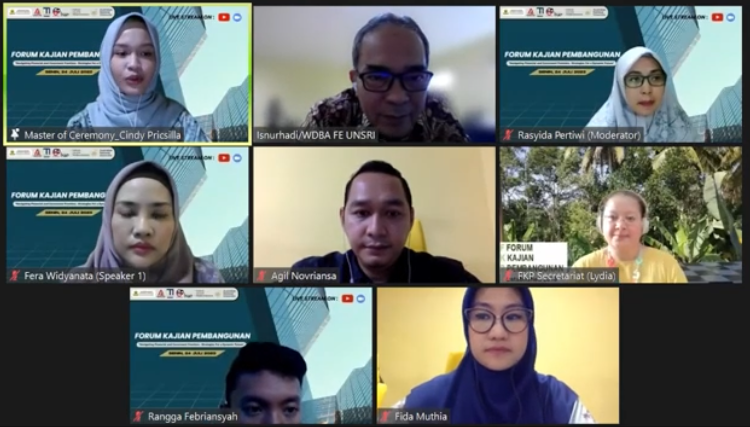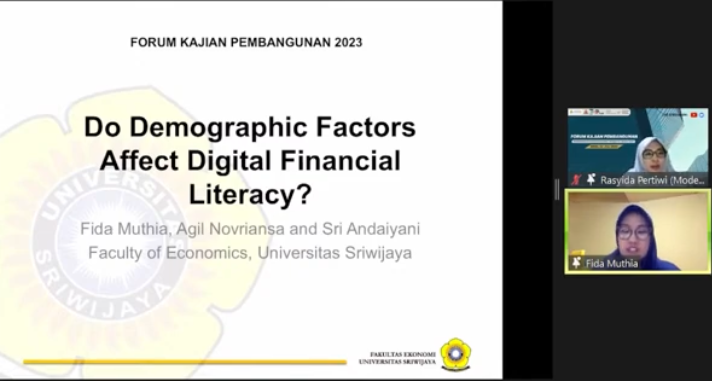FKP hosted by Faculty of Economics Universitas Sriwijaya (UNSRI) with Fera Widyanata, (Department of Development Economics, UNSRI), Fida Muthia (Department of Management, UNSRI), and Agil Novriansyah (Department of Accounting, Faculty of Economics UNSRI). Monday, 24 July 2023.
KEY POINTS:
The webinar featured recent research from UNSRI faculty members from the Department of Development Economics on Islamic finance, Department Management on financial literary and Department of Accounting on stress and burnout among government auditors.
- The study on Aqad Mudharabah and Musharakah on MSME’s financing during pandemic reveals that Aqad Mudharabah did not significantly affect MSMEs financing during the pandemic. Islamic banking faced challenges as the performance efficiency in distributing Aqad Mudharabah and Musharakah contracts was reduced, making it difficult for Islamic banks to meet their targets.
- The research on demographic factors and digital financial literacy in Sumatera and Java shows that age and digital financial literacy have an inverse relationship, while education shows a positive correlation with better digital financial literacy. Surprisingly, there is no significant gender or income-based disparity in digital financial literacy, possibly due to women having similar education levels as men in the sample.
- The study on stress arousal and burnout among local government internal auditors finds a positive association between stress arousal and emotional exhaustion, as well as depersonalization among local government internal auditors. However, supervisor support serves as a moderating variable, mitigating the impact of stress arousal and reducing feelings of burden and fatigue during the audit process.
SUMMARY
- The webinar featured recent research from UNSRI faculty members from the Departments of Development Economics, Management and Accounting, and was opened by Vice Dean Dr Isnurhadi. Fera Widyanata (Department of Development Economics) investigated the effects of COVID-19 on MSMEs financing in Indonesia, focusing on the role of Aqad Mudharabah and Musharakah contracts. Given the substantial contribution of MSMEs to Indonesia’s economy, accounting for about 60% of the GDP and employing 97% of the workforce, understanding the impact of the pandemic on their financing becomes necessary. Islamic banks place a strong emphasis on assets and production-based systems in the real sector, and they use Aqad Mudharabah and Musharakah contracts for capital and investment financing. This study aims to assess the impact of these contract types on MSMEs’ investment. The study findings suggest that Aqad Mudharabah has not significantly affected MSMEs financing during the COVID-19 pandemic. Previous research indicates that Islamic banking experienced reduced performance efficiency, particularly in the distribution of Aqad Mudharabah and Musharakah, due to the pandemic. On the other hand, funding with Aqad Musharakah also has yet to contribute to MSMEs financing during the Covid-19 pandemic. It is suspected because the Musharakah is not used for investment and capital financing but for consumptive and personal financing.
- In 2020, approximately 77% of the Indonesian population owned a mobile phone, and 48% had accounts for banking and other financial services. Recent research indicates that individuals using digital payments may face higher risks of overspending, illegal investment, fraud, and data breaches. Fida Muthia (Department of Management) examined the demographic factors influencing digital financial literacy in Sumatera and Java. The aim of this study is to shed light on how demographic factors, such as gender, age, education, and income, influence digital financial literacy in Indonesia. One of her findings is that age is inversely related to digital financial literacy, meaning that as individuals get older, their proficiency in digital financial matters tends to decrease. On the other hand, a positive correlation is observed between education and digital financial literacy, suggesting that individuals with higher educational attainment tend to possess better financial literacy in the digital context. Interestingly, there is no significant disparity in digital financial literacy between genders and income levels. This lack of difference may be attributed to the fact that women in the sample have similar education levels to men, resulting in a narrowing of the gender gap.
- Agil Novriansa (Department of Accounting) presented a study on stress arousal and burnout among local government internal auditors, with supervisor support as a moderating variable. Previous research has shown that burnout negatively affects job outcomes such as turnover intention, job satisfaction, job performance, and organizational commitment. Stress arousal, caused by work stressors, can lead to burnout, defined as a predictable psychological and physiological reaction to prolonged stress. Burnout is measured as a multidimensional construct, including emotional exhaustion, depersonalization, and reduced personal accomplishment. The research focuses on 155 local government internal auditors from 17 Government Inspectorates of District/City in four provinces in South Sumatera. The study reveals that stress arousal is positively related to emotional exhaustion and depersonalization, but not to reduced personal accomplishment. Stress arousal occurs before burnout, and intense and prolonged stress can overwhelm auditors, leading to emotional fatigue when facing work demands. However, supervisor support can mitigate the impact of stress arousal on emotional exhaustion and depersonalization. When supervisors build good interpersonal relationships with auditors through communication and information disclosure, auditors tend to feel less burdened and fatigued by the job demands during the audit process.







